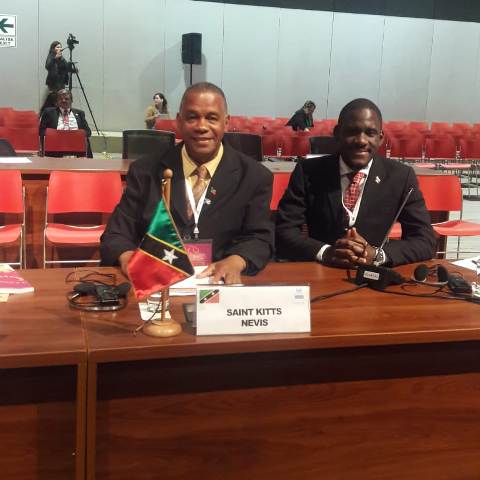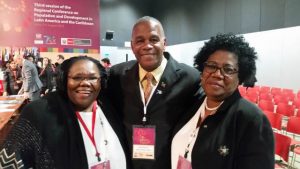NIA’s social programmes ahead of others in the region, Social Development Minister says

NIA CHARLESTOWN NEVIS (August 14, 2018) — Hon. Eric Evelyn, Minister responsible for Social Development on Nevis, believes the social programmes implemented by the Nevis Island Administration (NIA), through the Ministry of Social Development, are ahead of others in the region.
Mr. Evelyn expressed that sentiment following his attendance and participation as a panellist at the 3rd session of the Regional Conference on Population and Development in Latin America and the Caribbean in Lima, Peru from August 7 to 9, 2018. It was his first official overseas engagement as a minister of government.
“All of the islands and all of the countries that participated did not submit their reports but in terms of reports that I gleaned, I think we are head and shoulders above all of the other countries in Latin America and the Caribbean in terms of our programmes that we have with regards to the Montevideo Consensus on Population and Development,” he said.
The conference was held to examine the first regional draft report on the implementation of the Montevideo Consensus on Population and Development; to present national progress on the implementation of the Montevideo Consensus on Population and Development; and to consider a proposal for a virtual platform for the regional follow-up of the Montevideo Consensus.

Mr. Evelyn noted that the report presented from Nevis highlighted the programmes instituted by the NIA in the thematic areas.
“We were able to report on great things that are happening here on Nevis with regards to our young people, some of the programmes that we have from our Youth Department, of course our excellent programmes that we have for our seniors, we were able to report on those as well.
“We were able to report on things that are happening with our sexual and reproductive health, things that are happening with respect to human rights and so on,” he said.
The minister – who was accompanied by Mr. Anselm Caines, Senior Policy Officer in the Social Policy and Sustainable Development Unit – described the effort as a worthwhile one and thanked all who were instrumental in preparing the report.
He said following his presentation of the report, he received positive feedback from Dr. Natalia Kanem, Executive Director of the United Nations Population Fund (UNFPA) and others at the conference.
The next meeting will be held in two years and Mr. Evelyn says in the meantime, the administration will continue to consolidate its social programmes relating to the thematic areas.
“We have to continue to work hard in terms of young people, in terms of our ageing population, in terms of our human rights, in terms of sexual and reproductive health, in terms of fighting domestic violence and all of the other thematic areas that make up the Montevideo Consensus on Population and Development.
“I think we have a good thing going here in Nevis and all we have to do is consolidate. My ministry and departments will continue to work hard to ensure that we keep apace of what is happening in Latin America and the Caribbean and we have to ensure that we continue to have a good report where this Consensus is concerned,” he said.
The conference was organised by the United Nations Economic Commission for Latin America and the Caribbean (ECLAC) and the government of Peru with support from and UNFPA.
The Regional Conference on Population and Development in Latin America and the Caribbean, is a subsidiary body of ECLAC. It was established with the ultimate responsibility of monitoring and reviewing issues relating to population and development, international migration, indigenous peoples and Afro-descent populations and ageing.
The Montevideo Consensus on Population and Development was adopted in 2013 at the first session of the Regional Conference on Population and Development. Countries in Latin American and Caribbean who have adopted the Montevideo Consensus on Population and Development, have agreed to prioritise population dynamics in sustainable development, issues of youth and ageing, and access to sexual and reproductive health services.
Among those represented at the conference were Jamaica, Montserrat, Antigua and Barbuda, Trinidad and Tobago, Grenada, Belize, Suriname and Guyana.
